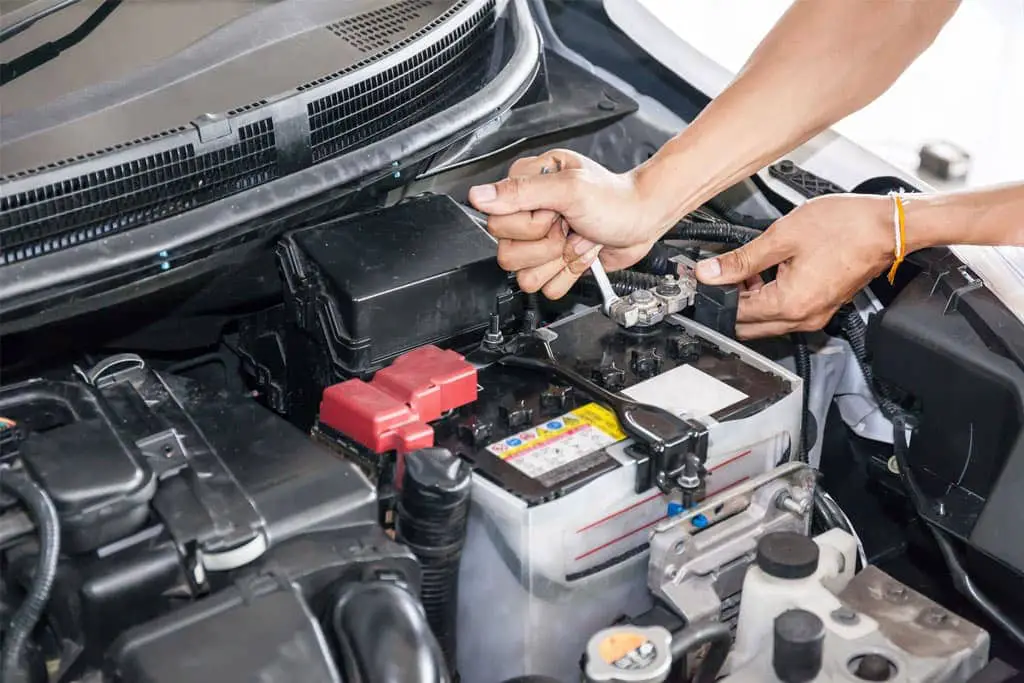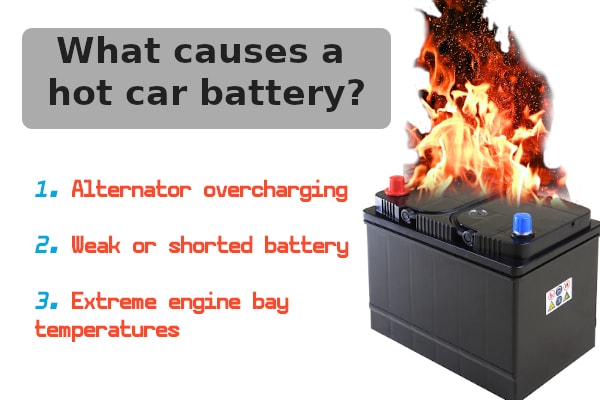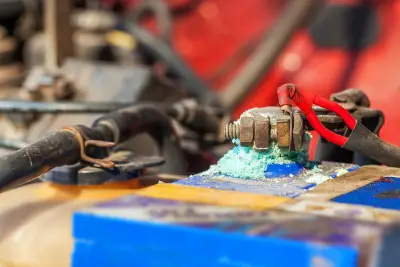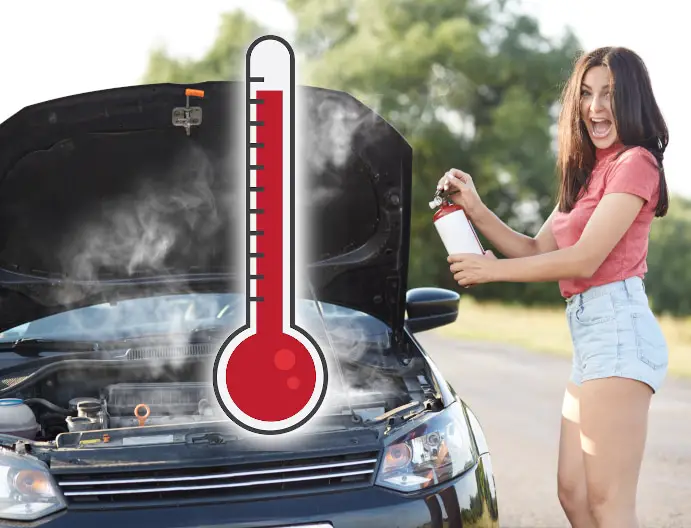Hey there, I’m Mike and if you’ve ever why’s your car battery hot or at an unusually high temperature, this is the article for you.

Read on to learn more.
Batteries overheating and other issues
In truth, if you’re wondering “why is my car battery hot to the touch?”, it’s hard to physically tell if you’re dealing with an overheating car battery. In most cases, other symptoms will start showing up before you get to the bottom of an overheating battery.
But can a car battery get too hot? Is it normal for a battery to feel hot after driving? If so, why is the car battery getting hot?

Unless you’re driving an exotic sports car or German Saloon, the car battery is usually located under the hood or engine bay. And since the car battery is in close proximity to a churning, hot engine, it’s easy to understand why a car battery gets hot, especially after a long drive on a hot summer day. It’s normal for under-hood engine bay temperatures to reach 200+ degrees Fahrenheit on a good day. And if your vehicle is force-induced with either a turbocharger or supercharger, under-hood temperatures can reach a sizzling-hot 350+ degrees Fahrenheit.
Think about that for a moment. Even though modern car batteries are designed to withstand extreme temperatures, an extremely hot car battery is a cause for concern. However, it’s normal for batteries to be hot to the touch after a short bit of driving. What’s worrying is if the battery gets too hot like a pot filled with boiling water.
What causes a hot car battery?

Here are 3 of the main causes of a hot car battery:
1. Alternator overcharging
This usually happens if the alternator’s voltage regulator is starting to fail. And when this happens, the alternator could start sending too much voltage for the battery. For clarity’s sake, the alternator is a mechanical device that charges the battery as the engine turns. The alternator is driven by a belt that is connected to the crankshaft of the motor. The alternator is the reason why a modern vehicle can operate reliably despite having more electrical loads.

Meanwhile, the voltage regulator has the task of regulating the charging voltage that the alternator produces. The voltage regulator is mounted either outside or inside the alternator housing. Without getting too technical on the details, the voltage regulator is an integral part of a vehicle’s charging system. If it fails, this means the alternator will continue charging the battery even if the voltage is still within 14.5 or 13.5 volts.
The result of a bad alternator? The battery can start overheating. Having too much voltage means the electrolyte solution will begin to boil and evaporate, which can ultimately lead to an explosion. Also, a defective voltage regulator will also destroy the alternator.
2. Weak or shorted battery
In some cases, a car battery that is hot to the touch is the first sign of a weak, bad, or failing car battery. If the battery is weak, it means the alternator will work double-time to charge the battery, which can also lead to overcharging issues and overheating. If this is the case, your best recourse is to replace the battery. But before doing that, it’s also a good idea to have the entire charging system diagnosed before ruling out a weak or failing battery.

Also, a short circuit or shorted battery can also cause overheating issues. Remember that lead-acid batteries may have a low internal resistance, but it can deliver powerful bursts of current when shorted. In fact, the heat may be high enough to melt cables or cause the battery to explode.
Read more about bad batteries vs failing alternators here
Things like charging your laptop with the car battery will cause it to wear out faster than usual.
3. Extreme temperatures in the engine bay

Common Questions Answered
Naturally, the engine bay is home to high temperatures when driving, most especially in the summer. It’s relatively normal for a car battery to get hot under normal operating conditions. Also, normal charging and discharging functions will also induce a small amount of heat. As long as the charging system is in good health, there’s no need to worry about an overheating battery unless you’re dealing with an old, worn out, or failing unit.
Can car batteries overheat?
Yes! But in the absence of issues with the charging system, it’s normal for car batteries to warm up a little bit more than usual. However, it’s a different story if the battery is literally smoking hot. If you notice a rotten egg smell in or around the engine bay, the first thing to check is the battery. That smell is most likely caused by evaporating fumes of sulfuric acid – a sure sign of an overheating or failing battery. Take note that a bad catalytic converter can also emit a rotten egg smell in the exhaust fumes.
What happens if my car battery overheats?
It’s tricky to know if your battery is overheating or not when you’re behind the wheel and actually driving the vehicle. But if a car battery does overheat, it means extreme heat is causing the battery fluid inside to prematurely evaporate. And as it happens, large amounts of fluid evaporation tend to aggravate overcharging problems.
Can a defective alternator cause a car battery to overheat?
Yes and no. When the alternator starts malfunctioning, it can go either way. It can either overcharge the battery, or it can stop charging the battery completely. If and when the alternator fails and starts sending too much voltage to the battery, overcharging or overheating can occur.
What are the symptoms of a bad car battery?
Here are the primary symptoms of a bad or failing car battery.
- There’s a bad smell emanating from under the hood
- The battery casing is warped, swelling, or cracked
- The engine is harder to crank or won’t crank at all
- Dimmer lights and all sorts of electrical issues and illuminated dash icons
- An illuminated check engine light
- Engine backfiring
Conclusion
It’s relatively normal for car batteries to get hot. But if it gets too hot to the touch, you’re most likely dealing with a failing battery or a minor electrical issue. At the first sign of an overheating car battery, your best recourse is to have the entire charging system diagnosed by a competent mechanic or auto electrician. If you’re lucky, changing the old battery to a new unit might be all it takes to get you back on the road.